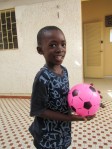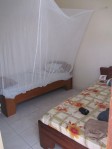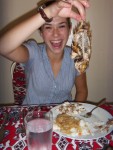It’s been a while since I could find the time to sit down and write about all that has happened! Tomorrow (Monday) will have officially been in Senegal for 1 month. The time has gone by quickly. I have spent all my time in Dakar so far, and while I am getting a good feel for the city, there are still many aspects of it which I feel like I have not explored yet.
I’ll try to get you up to date with what I’ve been doing without writing too too much. I’m sure I’ll end up writing more than you want to read, so sorry about that. Last weekend was relaxing. We didn’t do anything too adventurous, but I was able to spend some quality time with my family. On Saturday (10/2) after lunch I went with John (the American), and my siblings Amadou (I’ll guess he’s 15), Mami (12), and Ginor to Kermesse, a little carnival that was going on in the neighborhood. It was happening on the community basketball courts. It cost 300 CFA to buy a ticket to get in, which is the equivalent of about 65 cents. Then there were tickets to play the games, which cost about 40 cents each. I bought each of my siblings a few tickets so they could play the games. From what I can tell, the community development association of Mermoz put on the carnival. Most of the people working at the game stations were students about my age. John and I were the only white people there. The games were fairly simple, there was one where you had to toss coins and try to get them to land on a plate that was floating in a bucket of water. There was another where 5 candlesticks were standing upright supported in sand and you got one match to try to light them all (we would NEVER have this game at a children’s carnival in the U.S. It was Mami’s favorite game though). They had mini bowling and a game where you were blindfolded and given a pair of scissors to cut down a bag that was hanging from a tent with string. In each bag was either a prize or some torn up cardboard. When the kids won a game, they could get a prize. I ended up being the mom and holding everyone’s prizes while they played more games. Some of the prizes were coloring books, rulers, watercolor paints, and little bags of their “milk.” The kids, John, and I all had a lot of fun!
When we got back to the house there was a chicken in the courtyard. It stayed tied there for a few days, then disappeared one day. A few days later we had chicken for lunch and dinner… Ginor loves animals and was so excited to have the chicken around. He also found some snails in the potted plants in the courtyard and would often ask me to look at them with him. One night Ellen and I were looking at the snails with Ginor for probably 15 minutes. We saw them eat leaves (they have weird little tongues!), move around, climb up the plants, and even poop. Ginor loved it. The simple things that amuse you when you’re 8… He then tried to sell some of the escargots to Ellen to be her pets.
During the school week I had many hours of classes and definitely started feeling the monotony of the school routine. I wake up, shower, eat breakfast, walk to school, have 4 hours of class, walk home, eat lunch, walk back to school, have 4 more hours of class, use the internet, walk home, hang out, do homework, eat dinner, hang out, and go to bed. Over and over. But classes have been pretty interesting.
Friday (10/7), Grace, Ellen and I went downtown after class to L’Institut Français. It’s a place where there are a lot of cultural events like concerts, dance concerts, and films, plus a nice little café. We decided to see a film called L’Independence du Senegal, a documentary about Senegal’s Independence. It was pretty neat because the producer of the film, Amina Ndiaye Leclere was there and she spoke before the film and then led a discussion afterwards about it. It was hard to understand everything in the movie, but it was very interesting, and I really enjoyed the discussion afterwards because a bunch of people in the audience had opinions to share. I think we were the only Americans there, most people were Senegalese or European.
After the movie we got dinner in the café. As I’ve said, I have been craving a salad, so I ordered one, along with Grace and Ellen. I didn’t know what all the words in the descriptions of the salads meant, so we all decided to order a different one. Mine was really good and had a balsalmic dressing with some marinated meat on top. I knew right when I got it that I wasn’t sure I wanted to know what kind of meat it was. But, I decided to be adventurous and eat it and not worry to much about what exactly it was. Turns out that I ate a salad topped with marinated gizzards… mmmmmm…. Oh to be a foreigner who doesn’t speak the language fluently.
Saturday was a perfect day. We woke up early and met up with Neil, Sarah, and Erik, who are in Senegal as part of the Wisconsin program. The 6 of us walked along the Corniche (beach avenue area) to a supermarket and bought supplies for lunch. We walked another 2 miles to an area near a fish market, where we had heard you could get a boat to Île de Madeline, an island off the coast of Dakar. When we got close a man led us to a little shack where he said he’d introduce us to a boat captain. We negotiated the price of $10 per person for the man to take us to the island and back. After waiting in the shack for a while we headed with him to the boat, put on some life vests, and had a 10 minute boat ride to the island. Île de Madeline is a national park known for its rare bird species that live there and dwarf baobab trees. In the U.S. there would definitely be a national park service that took visitors there and charged them admission to the island, and maybe there is here, but we just went with a nice fisherman.
The island was gorgeous. There were only 5 other people on the entire island, another group that was visiting the beauty of a peaceful escape from the chaos of Dakar. The island is made up of volcanic rock, and has an inlet with clear water and a beautiful beach made of shells. We walked around part of the island, climbed a steep incline, and ate lunch on top of a hill that gave a great view of the rest of the island. The ocean breeze and beautiful views made our bread, Laughing Cow cheese, fruit, and juice taste much better. After we ate we explored more of the island, seeing some dwarf baobabs from a distance, climbing over the volcanic rocks, discovering the beetles that enjoying landing on my head, taking plenty of photos, and finally swimming in the clear pool of water in the inlet. The water was refreshing. I collected some shells and fragments of shells and even found some sea glass I brought home with me.
It was so nice to get away from all the cars, people, and noises that fill Dakar and to escape to a little island paradise for the day. We left around 4:30 with our captain/guide who had hung out at the island with us all afternoon. I was in a great mood and gave him a $2 tip.
Sunday we went on a tour of Dakar with the professor of our Dakar in Transition class. I wasn’t sure what to expect, but I showed up at the Boabab Center at 9 am and got into an air-conditioned van with Grace, Ellen, and Professor Diallo. The tour turned out to be super interesting. Not only was it our own free private driving tour of the city, but we also saw places I probably wouldn’t have seen otherwise. We drove through different neighborhoods to get a sense of how the city fits together. Professor Diallo said he wouldn’t walk with us through certain areas, because in some of the poorest neighborhoods people tend to be overly aggressive towards toubabs. It was strange to see the juxtaposition of wealth and poverty. At some points we would drive through areas that were very dirty and poor, where people did everything from hang out to wash clothes to cook in the streets, and then 5 minutes later we would be seeing embassies and huuuge homes. Dakar is definitely an interesting place.
We stopped at one beach in Ouakam where there is a mosque right on the beach. We were snapping pictures of the paraquets (boats) when this man came up and said it costs 1000 CFA ($2) to take pictures there. Professor Diallo got into a debate with this man about how it could be that you have to pay and receive a ticket permitting you to take pictures on a public beach. It reminded me of the type of thing my dad would get into a debate about. Professor Diallo said in French, “I’m a Senegalese citizen, this is just as much my beach as it is yours. Where is the ruling that says that I must pay? Where is a telephone number for someone I can talk to about this?” The man replied that he was the community president of the area and there is no telephone number, that he is in charge of handing out the tickets for photos. The debate went on for about 5 minutes before Professor Diallo said ok thank you and we continued along the beach and took more pictures once the guy walked away.
One of the best parts of the tour was going up to the lighthouse, which is on one of two hills in Dakar. It is the highest point of the city, and gives a great view of the surrounding area. It was cool and breezy under the shade of a tree and I liked being able to get a birds eye view of where I have been living for the past month. We ended our tour by visiting the apartment of one of Professor Diallo’s friends. It was super fancy and western, with a sleek kitchen with all sorts of appliances like a microwave, coffee maker, and toaster oven that I haven’t seen since I left the States.
Oh, an exciting piece of news: Dior (one of the married women in the house) had a baby! I’d been wondering how many months pregnant she was, but pregnancy is kind of a taboo subject here because of the evil spirit superstitions. She had a baby girl Friday night! Saturday morning while I was eating breakfast her husband shyly but proudly told me. It is customary for families to have a baptism for babies 7 days after they are born, so next Friday, the 14th I will hopefully be attending my first Senegalese baptism! This is where they name the baby, but also involves a lot of singing, dancing, and eating. They will slaughter a sheep for the event too. Can’t wait!
Ok, well I think this post has gotten long enough. Once again I’ve written more than I meant to. Hopefully it was interesting. I’ll write again soon. Oh and I have some pictures to put up so I’ll do that soon too.

















